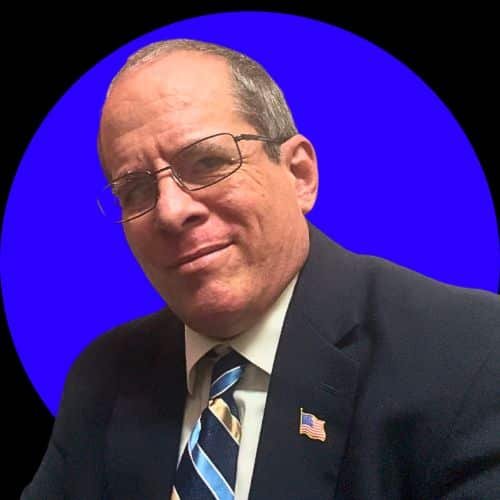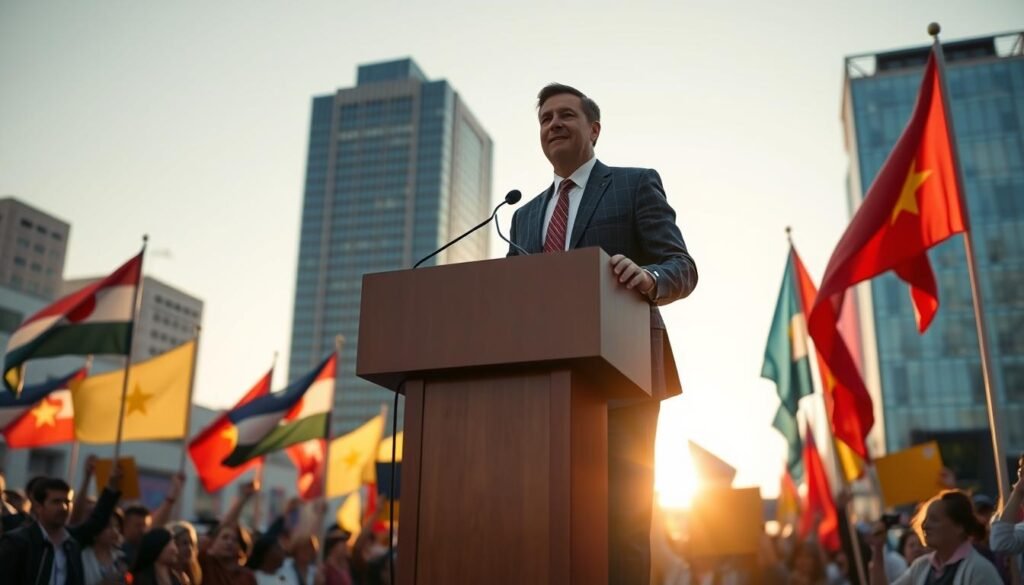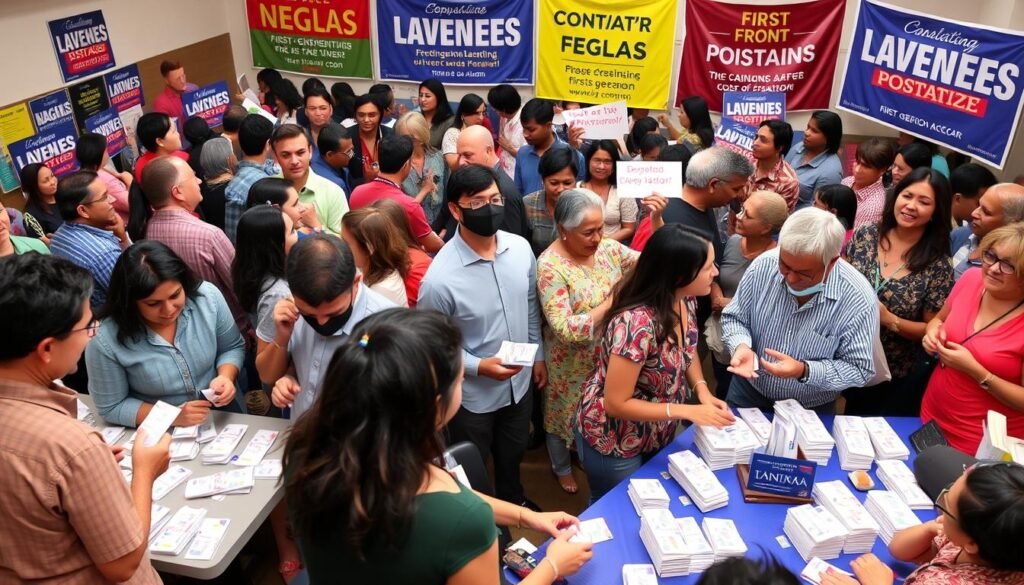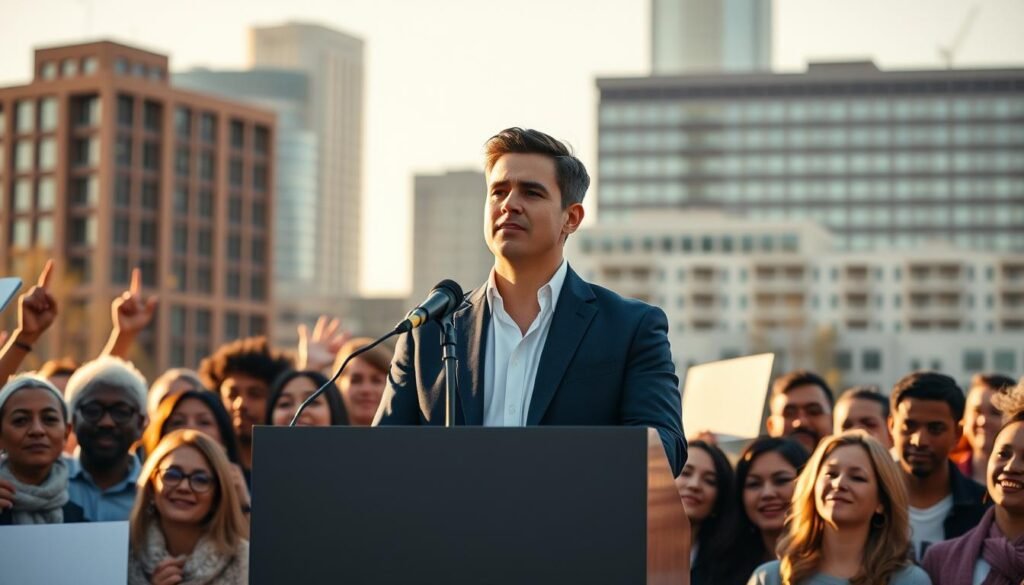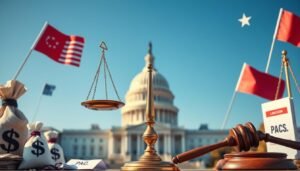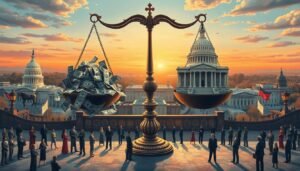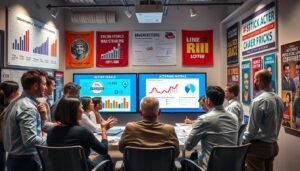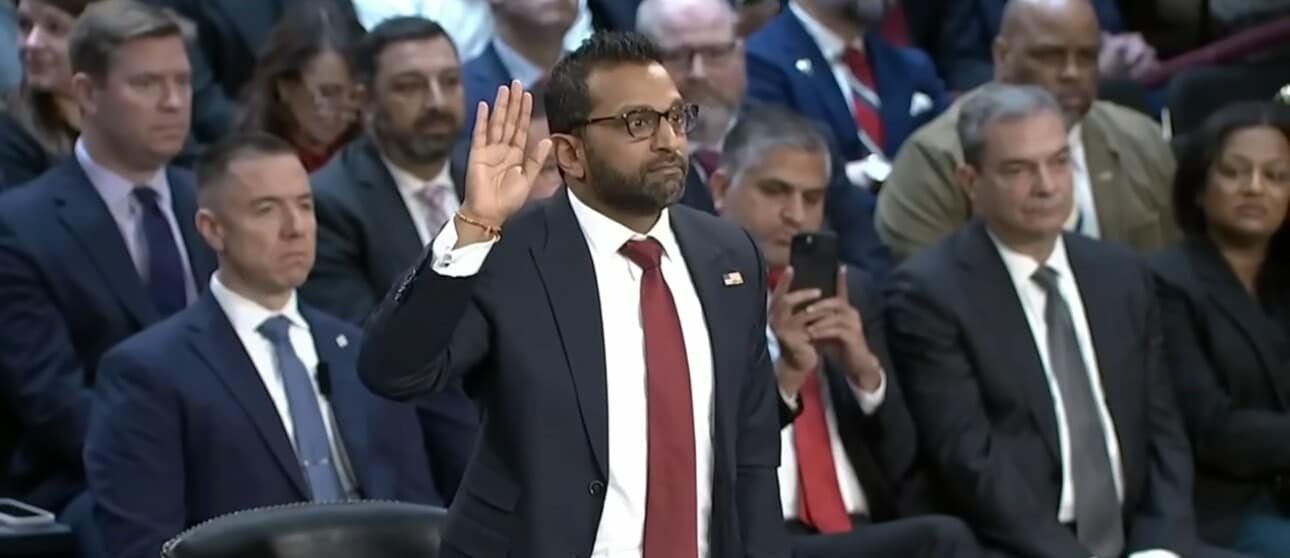How to Get Into Politics as a First-Generation Leader
Did you know 10 percent of Congress and 25 percent of state legislators are Gen Z or millennials? This is despite these groups making up only 43 percent of the population. It shows we need more young faces in politics. Starting a career in politics as a first-generation leader can seem tough. But, with the right help, it’s definitely doable. This article will guide you through the process.
Key Takeaways
- Only 10 percent of Congress and 25 percent of state legislators are Gen Z or millennials
- First-generation leaders can launch a successful career in public service with the right guidance and support
- A thorough guide on entering politics is key for first-generation politicians
- Having a solid education is critical for a career in politics
- It’s important to develop key leadership skills for success in politics
- Being active in your community is vital for first-generation leaders
Understanding the Political Landscape for First-Generation Leaders
Being a first-generation politician means knowing the current political scene well. The need for new views and ideas is high. Minority politician advice says it’s the perfect time for new leaders to step up. With more young voters coming, political leadership tips highlight the need to understand their values and worries.
First-generation politicians face unique hurdles, like less access to resources and networks. Yet, being new can be a plus. It means a fresh start and the chance to energize politics. First-generation politician can use their outsider status to build a broad support base. This can lead to politics that better reflects the diverse population.
To thrive, first-generation politicians must grasp several key points:
- Building a strong support network and community presence
- Developing essential political leadership skills, such as public speaking and policy analysis
- Understanding the current political climate and the opportunities and challenges it presents
| Demographic | Voter Turnout Rate | Projected Growth |
|---|---|---|
| Millennials and Gen Z | 50% | By 2028, account for half of the U.S. electorate |
Building Your Educational Foundation
Learning about politics, policy, and governance is key for first-generation leaders. Holly Lim, Lead Facilitator at LEE, says it’s vital to build a diverse leader pipeline. Developing critical thinking, problem-solving, and communication skills is essential.
Investing in education and personal growth is vital for success in politics. By following political leadership tips and using an entering politics guide, first-generation leaders can thrive. Focus on:
- Understanding the political landscape and current events
- Developing strong communication and public speaking skills
- Building a strong support network and coalition
By following these political leadership tips and using an entering politics guide, first-generation leaders can lay a strong foundation. They can then make a positive impact in their communities.
Developing Essential Political Leadership Skills
Being a first-generation politician means you need to learn key skills to succeed. You must know how to talk clearly, understand policies, form alliances, and handle tough situations. These abilities help you gain trust and make a difference in politics.
Important political leadership tips for beginners include having a clear vision, creating a strong team, and connecting with people. Campaign strategies for novices might include using social media, organizing community events, and working with local groups. For a first-generation politician, knowing the special challenges and chances of being new to politics is vital.
Recent studies show that 66% of Americans like direct democracy, and 75% think elected reps are good. This shows how critical good leadership is in politics. By using these political leadership tips and campaign strategies for novices, a first-generation politician can succeed and positively impact their community.
| Leadership Skill | Importance |
|---|---|
| Communication | High |
| Policy Analysis | Medium |
| Coalition Building | High |
| Crisis Management | Medium |
Establishing Your Community Presence
As you aim to become a political leader, it’s key to build trust with your community. This means connecting with local groups, joining in on community events, and talking directly with people. Young lawmakers often do this well, showing they really get what their community needs.
A good entering politics guide can help a lot. It should teach you how to make a strong community connection. This includes hosting town halls and meeting with different groups. With this knowledge, you can better serve your community.
Here are some ways to make a mark in your community:
- Build ties with local organizations and key players
- Go to community events and meetings
- Use social media and other ways to talk to people
Using these methods, you can create a strong community presence. This is vital for a successful political career. For instance, Planned Parenthood has 600 centers across the U.S. They focus on teaching about reproductive health, showing the value of reaching out to your community.
How to Get Into Politics as a First-Generation Leader: A Strategic Approach
Getting into politics as a first-generation leader needs a smart plan. You must find your political niche, build a support network, and create a political platform. This approach helps first-generation leaders succeed and make a difference.
Experts say campaign strategies for novices should include a strong online presence and community engagement. They also stress the need for a clear message. Political leadership tips highlight the importance of being resilient, adaptable, and open to learning from mistakes. Holly Lim, for example, has helped diverse candidates win and understands the challenges first-generation politicians face.
First-generation politicians should consider a few things:
- Identify your strengths and weaknesses
- Build a diverse support network
- Create a clear and compelling political platform
By using these campaign strategies for novices and political leadership tips, first-generation politicians can achieve success. They can leave a lasting mark in the political world.
| Category | Description |
|---|---|
| Campaign Strategies | Building a strong online presence, engaging with local communities, and developing a clear message |
| Political Leadership Tips | Resilience, adaptability, and a willingness to learn from failures |
Navigating Campaign Finance and Fundraising
As a first-generation politician, knowing campaign finance laws is key. It’s also important to have good fundraising strategies and manage resources well. Data shows 50% of U.S. households give money each year. This means many people can be reached with the right approach.
It’s vital for a first-time politician to learn about campaign finance laws. This knowledge helps avoid legal problems. Getting advice from seasoned politicians and experts can also be very helpful.
Some important things to think about in campaign finance and fundraising are:
- Understanding who gives money and why
- Creating a detailed fundraising plan
- Building a strong network of supporters
By handling campaign finance and fundraising well, a first-time politician can build a strong campaign. With the right strategies and tips, they can face and solve common problems. This way, they can reach their goals.
| Category | Donation Percentage |
|---|---|
| Individuals | 70% |
| Foundations | 15% |
| Corporations | 10% |
| Other | 5% |
Leveraging Digital Media and Social Platforms
As a first-generation politician, it’s key to grasp the role of digital media and social platforms. With 48.5% of voters being Millennials and Gen Z, having a strong online presence is vital. Novice campaign strategies should focus on creating engaging content and using social media to connect with people. Building a brand that appeals to younger voters is also important.
Some key statistics to consider when developing campaign strategies for novices include:
- 75% of young voters rely on social media platforms for political engagement and information
- 63% of voters prefer two-way communication with candidates on social media, boosting engagement
- Campaigns using tailored content for specific social media platforms can increase their outreach effectiveness by up to 50%
By effectively using digital media and social platforms, first-generation politicians can grow their brand and reach more people. They need to understand how to create engaging content and connect with voters online. With the right strategies, they can make a big impact in politics.
Building Cross-Cultural Coalitions
In today’s diverse political world, building cross-cultural coalitions is key for aspiring leaders. Recent data shows that close elections and narrow majorities are common. This makes it vital for new politicians to reach out to different groups.
Understanding the challenges and opportunities of various communities is essential. This means creating inclusive messages and multicultural outreach programs. Such efforts can help new politicians succeed and make a difference.
Effective strategies include working with local leaders, attending cultural events, and using social media. By doing these things and getting advice from experienced minority politicians, new leaders can build strong coalitions. This helps them achieve their goals.
Overcoming Common First-Generation Political Challenges
Being a first-generation politician comes with big challenges. Building a strong support network is key. This means finding mentors and staying strong when things get tough.
Important political leadership tips include knowing the political scene well. Also, finding where you can really help. For newbies, using social media to connect with voters is smart.
First-generation politicians often lack resources and networks. But, by learning new campaign strategies for novices, they can succeed. This way, they can truly make a difference in politics.
- Building a strong support network
- Developing a strong understanding of the political climate
- Identifying areas where they can make a meaningful impact
- Staying focused and resilient in the face of challenges
By following these political leadership tips and keeping up with new campaign strategies for novices, first-generation politicians can beat common hurdles. They can then find success in politics.
Conclusion: Your Path to Political Leadership
Starting your journey to become a first-generation political leader is a big step. It may be tough, but you have the chance to make a huge difference. By using the strategies and insights from this article, aspiring political leaders can face the challenges of first-generation politicians head-on.
Stay focused and work hard. Always remember the needs of your community. With determination and a commitment to public service, you can change lives. The future of politics is in your hands, and you’re ready to lead the way.
FAQ
What are the key considerations for first-generation leaders entering politics?
What unique challenges do first-generation politicians face?
How can first-generation leaders build a strong educational foundation for a career in politics?
What essential political leadership skills should first-generation leaders focus on developing?
How can first-generation leaders establish a strong community presence?
What are the critical steps for a strategic approach to getting into politics as a first-generation leader?
How can first-generation leaders navigate the challenges of campaign finance and fundraising?
Why is it important for first-generation leaders to leverage digital media and social platforms?
How can first-generation leaders build cross-cultural coalitions?
What are some common challenges first-generation politicians face, and how can they be overcome?
Source Links
- New partnership recognizes W&M first-generation initiatives
- From first-generation college student to trailblazing leader: How GSW shaped Alex Espitia’s journey
- Young Voters Have Growing Power, but Broken Politics Leave Them ‘Fatalistic,’ Studies Find
- 1. Politicians, changing leadership and political parties
- The Road to My First Vote: Finding My Voice as a First-Generation Immigrant
- Leadership Excellence in Politics (LEiP)
- Top 15 Qualities of a Good Leader
- Leading to Govern
- Bridging Divides: Tools for County Leaders to Overcome Division and Foster Collaboration
- The Best Community Outreach Strategies To Win Campaigns
- Their Generation: The Promise of Younger Elected Officials – Future Caucus
- 15 Strategies For Developing Next-Generation Leaders | Strategic Leader Coaching
- Key Leadership Lessons from the Journey of a First-Generation American
- First Day Podcast
- The Influence of the 2024 Presidential Election on Higher Education Fundraising
- Political Marketing: How to Reach Each Generation of Voters – Deep Sync
- Political Advertising: A Guide to Campaign Messaging Success
- Media Influence on Politics: 7 Election Trends in 2024
- Politics Without Winners: Can Either Party Build a Majority Coalition?
- How to Negotiate in Cross-Cultural Situations
- Resisting Authoritarianism: Lessons from Arkansas – The Forge
- Gen Z and the Politics of the Future | CCCU
- Changing the Political Conversation — The Conversation Factory
- Book Review | Following Their Leaders: Political Preferences and Public Policy, by Randall G. Holcombe


